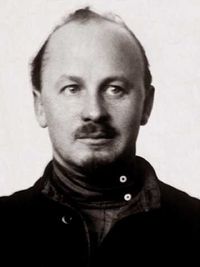
Born October 9, 1888 Died March 15, 1938 a nice picture of Nikolai. I'm hoping to help preserve the memories of his life, to help completely rehabilitate him, to help give to him the recognition he deserves in the pages of history and also to create and to help build his legacy, the reviving of which has been extremely delayed and opposed due to the fact that for five decades after his death he was criticized and denounced by the Soviet leadership and was only allowed to be referred to as a "vrag naroda", a label which was wrongfully and unjustly imposed upon him and also upon his family, the Russian words for enemy of the people. Nikolai Bukharin (the actual pronounciation of his last name is Boo- HA- reen, with stress and emphasis being put on the middle part of his name), who was called by some as the best liked and one of the most humaine members of the Bolshevik Party, is perhaps best known for his appearance as a defendant in March 1938 at the Trial of the Twenty One, the last and biggest of the three great Stalinist purge trials of old Bolshevik leaders. He was an intellectual. He joined the Bolsheviks in 1906 and rose to become one of the most prominent of the party's leaders. He was known as the party economist and theoretician. He wrote several books concerning the development of Marxism and Communism in Russia, was incorporated onto the party's Central Committee in 1917, became the editor of both of the Party's newspapers Pravda and Izvestia, and travelled widely both in Europe and internationally as far as North America. After Lenin's death Bukharin became a member of the Politburo and encouraged the development of Lenin's New Economic Policy (NEP) created in 1921, and a gradual nonviolent approach to achieving true communism. In the late 1920's and the 1930's it was Bukharin, along with his friends Alexei Rykov and Mikhail Tomsky who developed and provided an alternative to Stalin and Stalinism. These three men and their allies were the fighters for, and protectors of, the basic democratic rights of the majority of the people in Russia, in which approximately 85% of the population were peasants. However due to his opposition to Stalin's policy of forced collectivization Bukharin was removed from the Politburo in 1929, removed from both the Central Committee and the Party in January 1937 and was arrested in February of the same year. At his purge trial he was convicted of having ties with Trotskyite and Zinovievite terrorists, sentenced to death, and later was shot by officials of the NKVD.
all backgrounds on my site come from this site here and are used with permission.

View My Guestbook (I would love to hear from you, so please leave me a message!)
Click here to learn about the first part of Bukharin's life up until 1917.
Click here to learn about Bukharin's life and the events he witnessed from 1917 until about 1925.
I feel that Russia would have been quite a different country to live in if Bukharin had come to power instead of either Lenin or, later, Stalin. Hi, my name is Svetlana Yezhova. I'm a female from Canada, and I was born in 1978. Obviously, I'm a follower of both Marxism and Bukharinism. Click here to learn more about me and the reason why I decided to create this site, which I started in summer of 2001.
click here to read about Bukharin and the struggle for power after Lenin's death.
click here to read about Bukharin's relationship with Sergei Mironovich Kirov.
click here to read about how Stalin discredited Bukharin and had him removed from the party.
click here to read about Bukharin's arrest and bloody murder.
Click here for information on the differences between Karl Marx's theories, which were based on democracy and majority rule, and the Soviet brand of totalitarianism, which was not based on democracy and freedom but rather on power and control over the masses by a small minority group of revolutionary elitist so called revoluttionaries.
Click here for information on the Soviet secret police during the time of Lenin and Stalin:
click here to see a bibliography of the books I used to gather information for this website.
Click here for information on Stalin's First Five Year Plans for agriculture, his forced collectivization policy, how forced collectivization was accomplished, the reaction of the peasants toward the policy of forced collectivization, and how the policy of forced collectivization affected the peasantry as a whole.
All backgrounds on this site come from this site here and are used with permission.